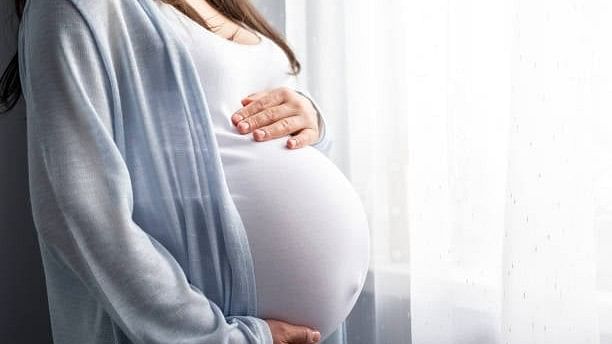
Image for representation.
Credit: iStock Photo
Research is revealing intriguing clues about how pregnancy changes the brain.
Studies scanning women's brains before and after pregnancy have found that certain brain networks, especially those involved in social and emotional processing, shrink during pregnancy, possibly undergoing a fine-tuning process in preparation for parenting. Such changes correspond with surges in pregnancy hormones, especially estrogen, and some last at least two years after childbirth, researchers have found.
A new study, published Monday in the journal Nature Neuroscience, adds to the picture by documenting with MRIs brain changes throughout one woman's pregnancy. It confirms previous results and adds detail, including that white matter fibers showed greater ability to efficiently transmit signals between brain cells, a change that evaporated once the baby was born.
"What's very interesting about this current study is that it provides such a detailed mapping," said Elseline Hoekzema, a neuroscientist who heads the Pregnancy and the Brain Lab at Amsterdam University Medical Center and has helped lead studies analyzing brain scans of more than 100 women before and after pregnancy.
Hoekzema, who was not involved in the new study, said it showed that along with previously documented "longer-lasting changes in brain structure and function, more subtle, transient changes also occur."
Dr. Ronald Dahl, director of the Institute of Human Development at the University of California, Berkeley, who was not involved in the new study, said the emerging research reflected the key role of hormones in transitions such as puberty and pregnancy, guiding neurological shifts in priorities and motivations.
"There is that sense that it's affecting so many of these systems," he said.
The study participant, Elizabeth Chrastil, is a neuroscientist at the University of California, Irvine. She became pregnant in 2019, at 38, after in vitro fertilization. That allowed precise tracking of her pregnancy from the start.
She had 26 brain MRIs -- four pre-pregnancy scans, which started three weeks before; 15 during pregnancy; and seven in the two years after her son's birth in 2020.
"It was sort of cool being able to be a neuroscientist and to know what we don't know," Chrastil said, "and so to be able to say: 'Hey, let's do this. I'm about to become pregnant. I think we should do this.'"
She said that during pregnancy, she was unaware of any symptoms or effects linked to the brain changes. Her brain, however, exhibited profound differences.
By the ninth week of gestation, 80 per cent of 400 brain areas analyzed showed decreases in gray matter volume and cortical thickness that continued through pregnancy, with areas shrinking by 4 per cent on average. Change was particularly pronounced in the default mode network, which is instrumental in perceiving other people's feelings and perspectives.
The study's senior author, Emily Jacobs, a neuroscientist at University of California, Santa Barbara, said pregnancy brain shrinkage was "not a bad thing" and probably reflected pruning that "enables the brain to become more specialized." Similar processes occur during puberty and infancy and some neurological disorders arise from inadequate pruning, she noted.
As with Michelangelo's statue of David, she said, "the artist starts off with this big block of marble and the underlying beauty is revealed through the art of removal, carefully honing and fine-tuning the material." In this study, she said, "you can see the sculpting of the brain unfold week by week."
The volume loss mostly persisted two years postpartum, suggesting that pregnancy hormones prompt "permanent etchings in the brain," she said.
White matter changes, however, did not last. For unclear reasons, Chrastil said, over the first two trimesters, the fiber bundles became like roads with improved paving, which "makes things go more smoothly, information can travel more seamlessly." By childbirth, the initial white matter condition returned.
For comparison, researchers evaluated brain imaging from eight people who were not pregnant, including two men. Their brains did not show such alterations.
But subsequent pregnancy brain scanning of several women has echoed Chrastil's pattern, Jacobs said.
Hoekzema said the pattern was so distinctive that her team showed that a computer algorithm could identify if women were pregnant "based only on the changes in their brains."
Her team's research "suggests that brain changes during pregnancy relate to the way a mother's brain and body react to infants," she said, correlating with characteristics like "maternal-fetal bonding, nesting behavior and the way a woman's heart rate reacts to seeing an infant."
Dahl said pregnancy-related hormones might create neurological "windows of learning" that "sensitize individuals to learn adaptive things and create bonds and develop greater expertise in responding to an infant." Providing social and emotional support during pregnancy would therefore be even more helpful because the brain is tuned to prioritize that information, he said.
Still, the implications for parenting are undoubtedly complex and varied. For example, Jacobs said, adoptive parents, fathers and others "may not experience gestation firsthand, yet display all of the nurturing behaviors needed to care for their children."
Researchers say studying pregnancy brain changes might yield information about conditions like postpartum depression and neurological effects of preeclampsia.
"We're just starting to scratch the surface of understanding," Chrastil said.